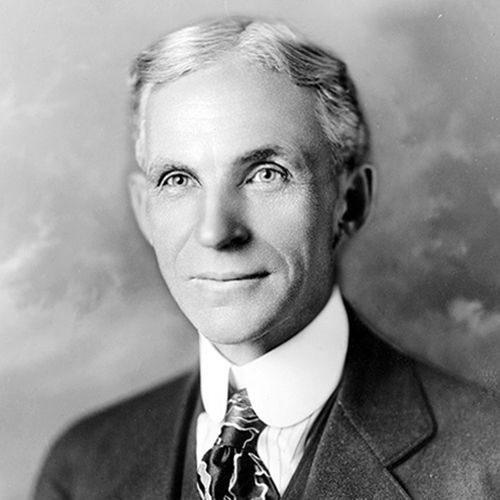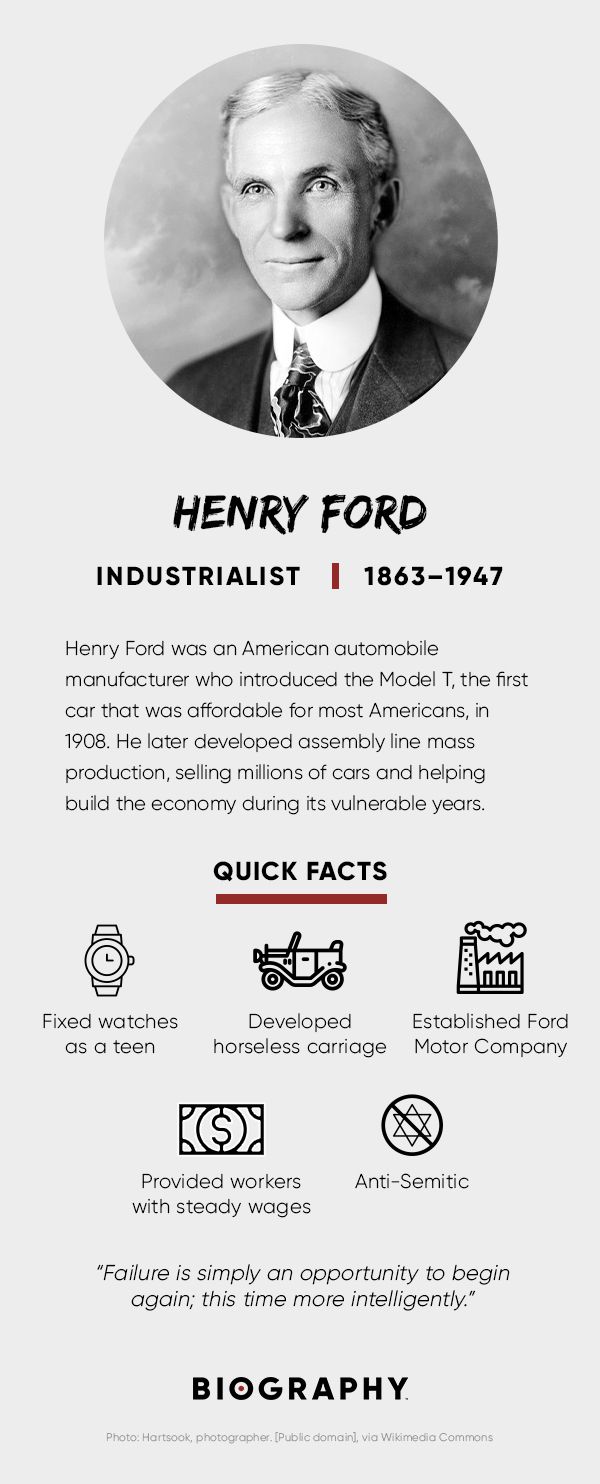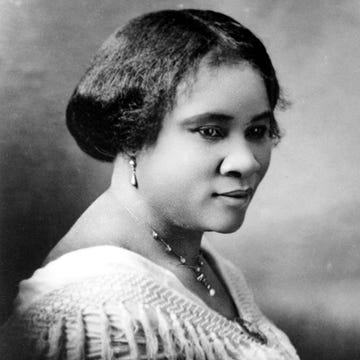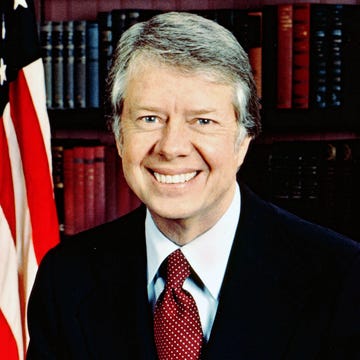(1863-1947)
Who Was Henry Ford?
Henry Ford was an American automobile manufacturer who created the Model T in 1908 and went on to develop the assembly line mode of production, which revolutionized the automotive industry.
As a result, Ford sold millions of cars and became a world-famous business leader. The company later lost its market dominance but had a lasting impact on other technological development, on labor issues and on U.S. infrastructure. Today, Ford is credited for helping to build America's economy during the nation's vulnerable early years and is considered one of America's leading businessmen.
Early Life and Education
Ford was born on July 30, 1863, on his family's farm in Wayne County, near Dearborn, Michigan.
When Ford was 13 years old, his father gifted him a pocket watch, which the young boy promptly took apart and reassembled. Friends and neighbors were impressed and requested that he fix their timepieces too.
Unsatisfied with farm work, Ford left home at the age of 16 to take an apprenticeship as a machinist at a shipbuilding firm in Detroit. In the years that followed, he would learn to skillfully operate and service steam engines and would also study bookkeeping.
In 1888, Ford married Clara Ala Bryant. The couple had a son, Edsel, in 1893.
Inventions
In 1890, Ford was hired as an engineer for the Detroit Edison Company. In 1893, his natural talents earned him a promotion to chief engineer.
All the while, Ford developed his plans for a horseless carriage. In 1892, Ford built his first gasoline-powered buggy, which had a two-cylinder, four-horsepower engine. In 1896, he constructed his first model car, the Ford Quadricycle.
In the same year, he attended a meeting with Edison executives and found himself presenting his automobile plans to Thomas Edison. The lighting genius encouraged Ford to build a second, better model.
Ford Motor Company
By 1898, Ford was awarded with his first patent for a carburetor. In 1899, with money raised from investors following the development of a third model car, Ford left Edison Illuminating Company to pursue his car-making business full-time.
After a few trials building cars and companies, Ford established the Ford Motor Company in 1903.
Model T
Ford introduced the Model T, the first car to be affordable for most Americans, in October 1908 and continued its construction until 1927. Also known as the “Tin Lizzie,” the car was known for its durability and versatility, quickly making it a huge commercial success.
For several years, Ford Motor Company posted 100 percent gains. Simple to drive and cheap to repair, especially following Ford’s invention of the assembly line, nearly half of all cars in America in 1918 were Model T's.
By 1927, Ford and his son Edsel introduced another successful car, the Model A, and the Ford Motor Company grew into an industrial behemoth.
Henry Ford's Assembly Line
In 1913, Ford launched the first moving assembly line for the mass production of the automobile. This new technique decreased the amount of time it took to build a car from 12 hours to two and a half, which in turn lowered the cost of the Model T from $850 in 1908 to $310 by 1926 for a much-improved model.
In 1914, Ford introduced the $5 wage for an eight-hour workday ($110 in 2011), more than double what workers were previously making on average, as a method of keeping the best workers loyal to his company.
More than for his profits, Ford became renowned for his revolutionary vision: the manufacture of an inexpensive automobile made by skilled workers who earn steady wages and enjoyed a five-day, 40-hour work week.
Philosophy and Philanthropy
Ford was an ardent pacifist and opposed World War I, even funding a peace ship to Europe. Later, in 1936, Ford and his family established the Ford Foundation to provide ongoing grants for research, education and development.
In business, Ford offered profit sharing to select employees who stayed with the company for six months and, most important, who conducted their lives in a respectable manner.
At the same time, the company's "Social Department" looked into an employee’s drinking, gambling and otherwise uncouth activities to determine eligibility for participation.
Henry Ford, Anti-Semite
Despite Ford’s philanthropic leanings, he was a committed anti-Semite. He even went as far as to support a weekly newspaper, The Dearborn Independent, which furthered such views.
Ford published a number of anti-Semitic pamphlets, including a 1921 pamphlet, "The International Jew: The World's Foremost Problem.” Ford was awarded the Grand Cross of the German Eagle, the most important award Nazis gave to foreigners, by Adolf Hitler in 1938.
In 1998, a lawsuit filed in Newark, New Jersey, accused the Ford Motor Company of profiting from the forced labor of thousands of people at one of its truck factories in Cologne, Germany during World War II. The Ford company, in turn, said the factory was under the control of the Nazis, not the American corporate headquarters.
In 2001, Ford Motor Company released a study which found that the company did not profit from the German subsidiary, at the same time promising to donate $4 million to human rights studies focused on slavery and forced labor.
Death
Ford died on April 7, 1947, of a cerebral hemorrhage at the age of 83, near his Dearborn estate, Fair Lane.
Henry Ford Museum
Ford was an avid collector of Americana, with a particular interest in technological innovations and the lives of ordinary people: farmers, factory workers, shopkeepers and business people. He decided to create a place where their lives and interests could be celebrated.
Opening in 1933, the Henry Ford Museum in Dearborn, Michigan, displays the thousands of objects Ford collected and many more-recent additions, such as clocks and watches, an Oscar Mayer Wienermobile, presidential limousines and other exhibits.
Also on display in the expansive outdoor Greenfield Village are operational railroad roundhouses and engines, the Wright Brothers bicycle shop, a replica of Thomas Edison's Menlo Park laboratory and Ford's relocated birthplace.
Ford's vision for the museum was stated as, "When we are through, we shall have reproduced American life as lived; and that, I think, is the best way of preserving at least a part of our history and tradition."
"],["
"]]" tml-render-layout="inline">
QUICK FACTS
- Name: Henry Ford
- Birth Year: 1863
- Birth date: July 30, 1863
- Birth State: Michigan
- Birth City: Wayne County
- Birth Country: United States
- Gender: Male
- Best Known For: Henry Ford was an industrialist who revolutionized assembly line production for the automobile, making the Model T one of America’s greatest inventions.
- Industries
- Business and Industry
- Astrological Sign: Leo
- Schools
- Goldsmith, Bryant & Stratton Business College in Detroit
- Interesting Facts
- Upon Thomas Edison's blessing, Henry Ford sought to make a better car model and eventually started his own company.
- Ford became renowned for his revolutionary vision: the manufacture of an inexpensive automobile made by skilled workers who earn steady wages.
- Despite his pacifism and philanthropy, Ford was strongly anti-Semitic.
- Death Year: 1947
- Death date: April 7, 1947
- Death State: Michigan
- Death City: Dearborn
- Death Country: United States
Fact Check
We strive for accuracy and fairness.If you see something that doesn't look right,contact us!
CITATION INFORMATION
- Article Title: Henry Ford Biography
- Author: Biography.com Editors
- Website Name: The Biography.com website
- Url: https://www.biography.com/business-leaders/henry-ford
- Access Date:
- Publisher: A&E; Television Networks
- Last Updated: September 5, 2019
- Original Published Date: April 3, 2014
QUOTES
- The only history that is worth a tinker's damn is the history we make today.
- Failure is simply an opportunity to begin again; this time more intelligently.
- The only real mistake is one from which we learn nothing.
- If I had asked people what they wanted, they would have said, 'Faster horses.'
- Enthusiasm is the yeast that makes your hopes shine to the stars.
- Vision without execution is just hallucination.
- A business that makes nothing but money is a poor business.
- You don't have to hold a position in order to be a leader.
- Quality means doing it right when no one is looking.
- Don't find fault, find a remedy.
- Whether you think you can, or you think you can't—you're right.













